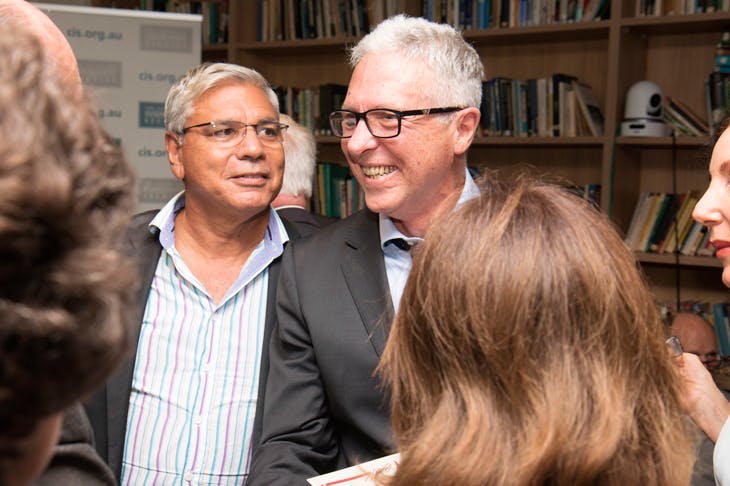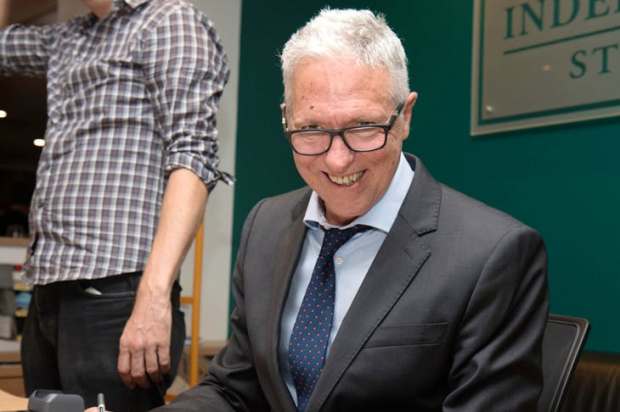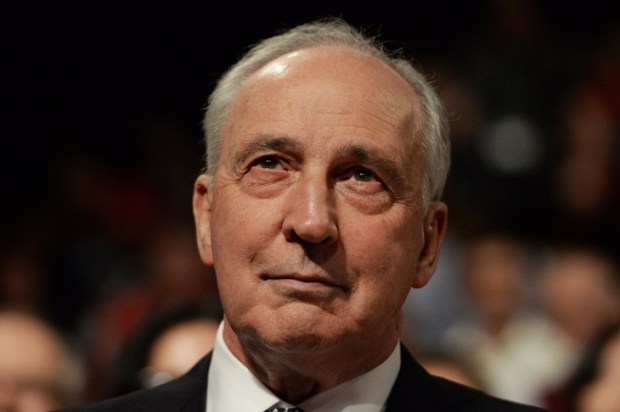The death of great men illuminate the darkness like lightning on a stormy night. So it is with Bill Leak, a seriously funny man in an age when laughter is life-threatening. Jihadists and political correctness crusaders were united in the cause of silencing him.
Shortly after Islamists butchered satirists at Charlie Hebdo, sacred vigilantes threatened to separate Bill’s brilliant head from his sturdy neck.
He stuck to his guns, metaphorically. Indeed, after he’d painted a portrait of notorious gangster Chow Hayes, Bill counted among his friends a shadowy figure rumoured to be a hit man, who offered to procure the artist’s weapon of choice in less than 24 hours. But Bill was a gentle soul, worried about his beloved wife and step-daughter, so he sold his house for a song and went into hiding.
About a year later, the thought police invoked Section 18C of the 1975 Racial Discrimination Act, which makes it unlawful to ‘offend, insult, humiliate or intimidate’ someone because of their race. ‘I don’t know which is worse,’ he said. ‘With the jihadists, I had to sell my house. But with the bastards at the Human Rights Commission I would have lost it altogether, if the paper wasn’t paying the bills.’
One of my few regrets in seven years’ hard labour as opinion editor at the Australian (or hard Labor as it seemed in the Rudd-Gillard-Rudd years) was lifting Tim Soutphommasane out of obscurity. I was no fan of his style, laden with the sort of academic jargon that obscures ideas and is meant to aggrandise the author. I ran his work because unusually, for someone on the Left he defended patriotism. Then, with a mischief only a divinely ironic God could conceive of, Soutphommasane secured the lucrative sinecure of Race Commissioner and we finally got to see what his opaque ideas about patriotism meant for the country.
Of offensive speech in Australia there is no shortage. In September 2012, a small child held up a placard at a public demonstration which read, ‘Behead all those who insult the Prophet’. The mother, a university-educated Jordanian, wearing a hijab, proudly photographed her son holding the placard but later claimed she didn’t know what the word ‘behead’ meant.
The Human Rights Commission was conspicuous in its silence. After all, inciting hatred and murder against all those who are not fundamentalist Muslims is an equal opportunity crime. Not that bringing up race necessarily excited their interest. When someone put up a sign on a major thoroughfare in Sydney which said ‘Jews make great lampshades’, there was no commotion at the HRC. Or when Sheik Ismail called at a Sydney mosque for a Jewish genocide; the banality of Islamist evil was of little interest.
What roused the Lilliputians at the Human Rights Commission from arguing over which end of an egg to crack, was a cartoon Bill drew of an Aboriginal dad, too drunk to remember his own son’s name, let alone give him enough guidance to keep the kid out of a detention centre. Never mind that alcoholism and domestic violence are at crisis point in Aboriginal communities, the Race Commissioner was so determined to persecute the cartoonist that he took to the media soliciting for a complaint; the self-proclaimed defender of a new Australian patriotism called for a vendetta on The Sentimental Bloke.
In response, in glorious tribute to his name, Leak, like Gulliver, pissed from a great height on the pieties and the very citadel of his assailants. Treason! cried the little Queen and her courtier, even more determined to punish the great man because although, in relieving himself, he had put out a few fires, he had committed the much more serious crime of giving us all a good laugh.
Bill was one of three journalists I knew in Australia who had had to change their residence and go into hiding because of death threats from Islamic terrorists. The grandson-in-law of Peter Coleman is still recovering from the life-threatening wounds he received in the Charlie Hebdo massacre. Another colleague stopped publishing work about trade union corruption after receiving death threats.Anna Politkovskaya, spoke at the Sydney Writers’ Festival of the death threats she received because of her fearless reporting on the Chechen wars. She was eventually murdered a few years later, on Vladimir Putin’s birthday. In the face of all this, the Australian Human Rights Commission wastes millions of taxpayer dollars on trivial pursuits, while racist sheiks preach genocide and scribes are forced into hiding.
As unfairly underrated as his friend and inspiration Brett Whitely, jealous pygmies of the Australian art scene were also determined to deny Bill the Archibald prize for portraiture that he so manifestly deserved. With trademark modesty, Bill often said that his works for the newspaper were ‘only cartoons’.
In truth, he was an artist of the ‘statue’, as Sir Les Patterson would say, of Hogarth, Goya or Daumier. At least, unlike Daumier, he didn’t have to go to prison because of his biting satire but any law that could be used to make his last months on earth a trial, in ways that even Kafka would have been astonished at, must be repealed.
The only language that should be criminal is language that incites violence, hatred or murder. The rest must be tolerated. Bad ideas should be revealed through robust debate, and research and ridicule. And laws which claim that it is worse to slaughter people because they are Jews or Tutsis than because they are mentally ill or physically disabled or are a cartoonist or journalist or a blogger, or an author or a translator or an adulterer or an apostate are wrong. The politics of identity must be punctured, not used for promotion or punishment.
Last autumn, I went for a walk with Bill. I was feeling blue. An elderly neighbour that I adored, an artist who made wickedly funny cards, had died. After her death, an uncanny thing happened. I started drawing in a way I had never done before, sensing her guiding me, as if she was not ready to say goodbye. I told Bill, who’d met her.
‘I knew you were going to say that before you told me,’ he said. ‘I’ve had the same experience myself.’
Bill was not a martyr to free speech, cut down by satanic scimitars or worn out by the thought police, but carried off by a heart that cracked because it could not contain all the love within it. We will never see his like again. But one can only hope, that in some uncanny way, his presence will guide us for a while, that he is not quite ready to say goodbye.
Got something to add? Join the discussion and comment below.
Get 10 issues for just $10
Subscribe to The Spectator Australia today for the next 10 magazine issues, plus full online access, for just $10.
You might disagree with half of it, but you’ll enjoy reading all of it. Try your first month for free, then just $2 a week for the remainder of your first year.














Comments
Don't miss out
Join the conversation with other Spectator Australia readers. Subscribe to leave a comment.
SUBSCRIBEAlready a subscriber? Log in